I have to be honest. My idea of what an eBike is for and does was totally wrong. I know this because I’ve spent the last month or so riding the VanMoof S3, a $2,300 electric bike, putting nearly 100 miles on it during that time. For some, that distance may sound trivial, but I can promise you the I haven’t ridden 100 miles on a bike in the last 10 years combined.
Indeed, part of the reason I put so many miles on the S3 over the last few weeks was to test out the bells and whistles (figuratively, and literally), but also because I decided to start exercising more. And even though eBikes feature a motorized pedal-assist to do some or all of the work for you, I’ve yet to come home drenched in sweat after a long ride on the S3.
Just what makes the S3 and worth $2,300? I’ll attempt to answer that question below — but let me tell you, after using one for a while, don’t be surprised if you see me cruising on one of my own in the near future.
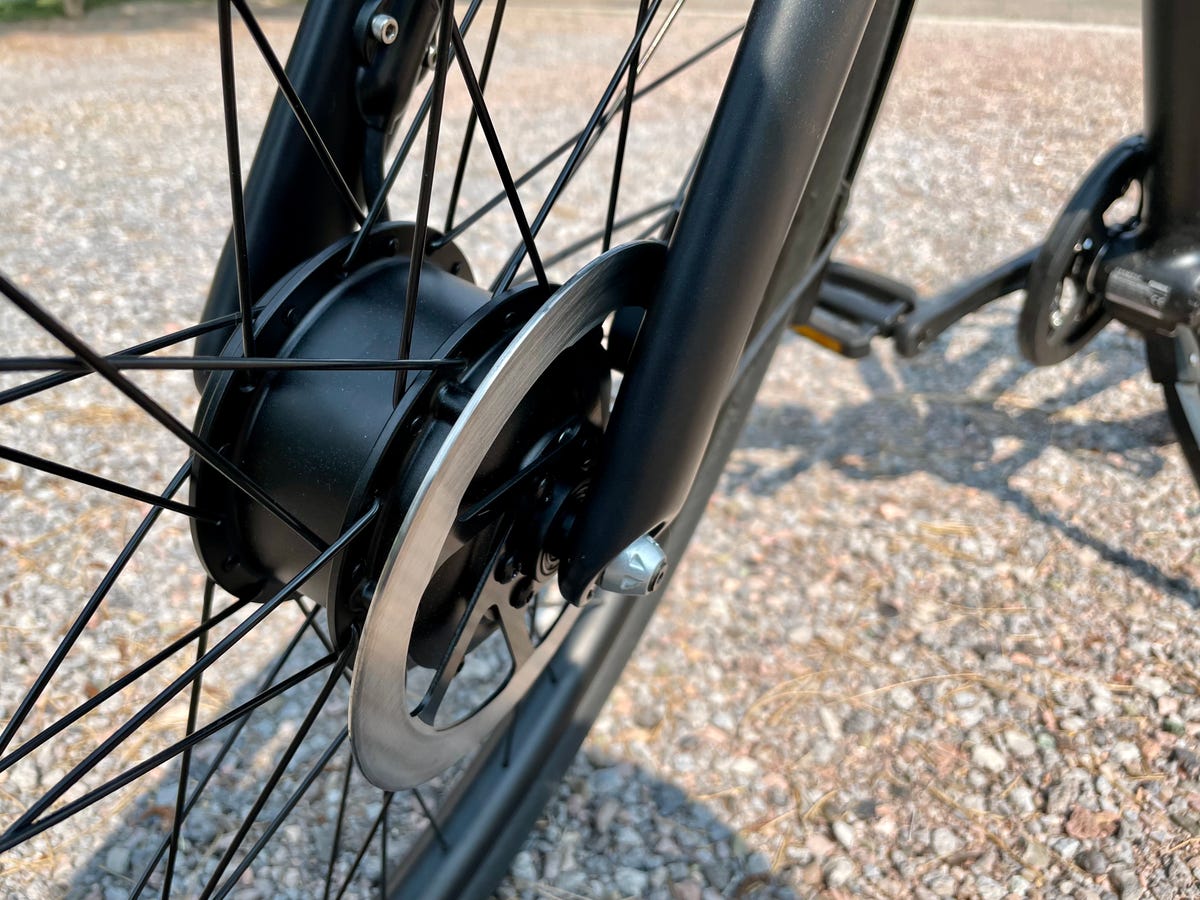
The front wheel and motor of the VanMoof S3.
Jason Cipriani/ZDNet
Don’t live near a VanMoof store? No problem
VanMoof only has a handful of showrooms throughout the US. It’s at those stores where you can book a test ride in places like Seattle, San Francisco or Brooklyn. If you don’t live in one of those areas, it’s not ideal, but that doesn’t exclude you from ordering a VanMoof bike.
I live in the middle of Colorado, so VanMoof had to ship a bike to me. The bike arrives partly assembled, requiring only the installation of the front wheel and pedals upon arrival.
Included in the box along with the bike itself is a toolkit with most of the tools you’ll need to do any repairs on your own, a foot pump for airing up your tires and a kazoo — for celebrating your purchase.
VanMoof’s YouTube channel is full of tutorial videos that walk you through the initial assembly, and if you run into trouble while owning the bike and want to go the DIY route, you can watch the videos to complete any maintenance or repairs on your own.
It took me about 30 minutes to get the bike put together, splitting my time between checking out what all was included in the box, and watching the assembly video a couple of times before tackling the task at hand.
The bike arrived fully charged, and VanMoof included the external battery pack for extended range testing.
In addition to attaching the front wheel, the rest of the setup process required my iPhone. Actually, it requires an iPhone or Android phone and the VanMoof app. You use the app to adjust settings, view stats such as your current speed, ride history, lock and unlock the bike and view its current location.
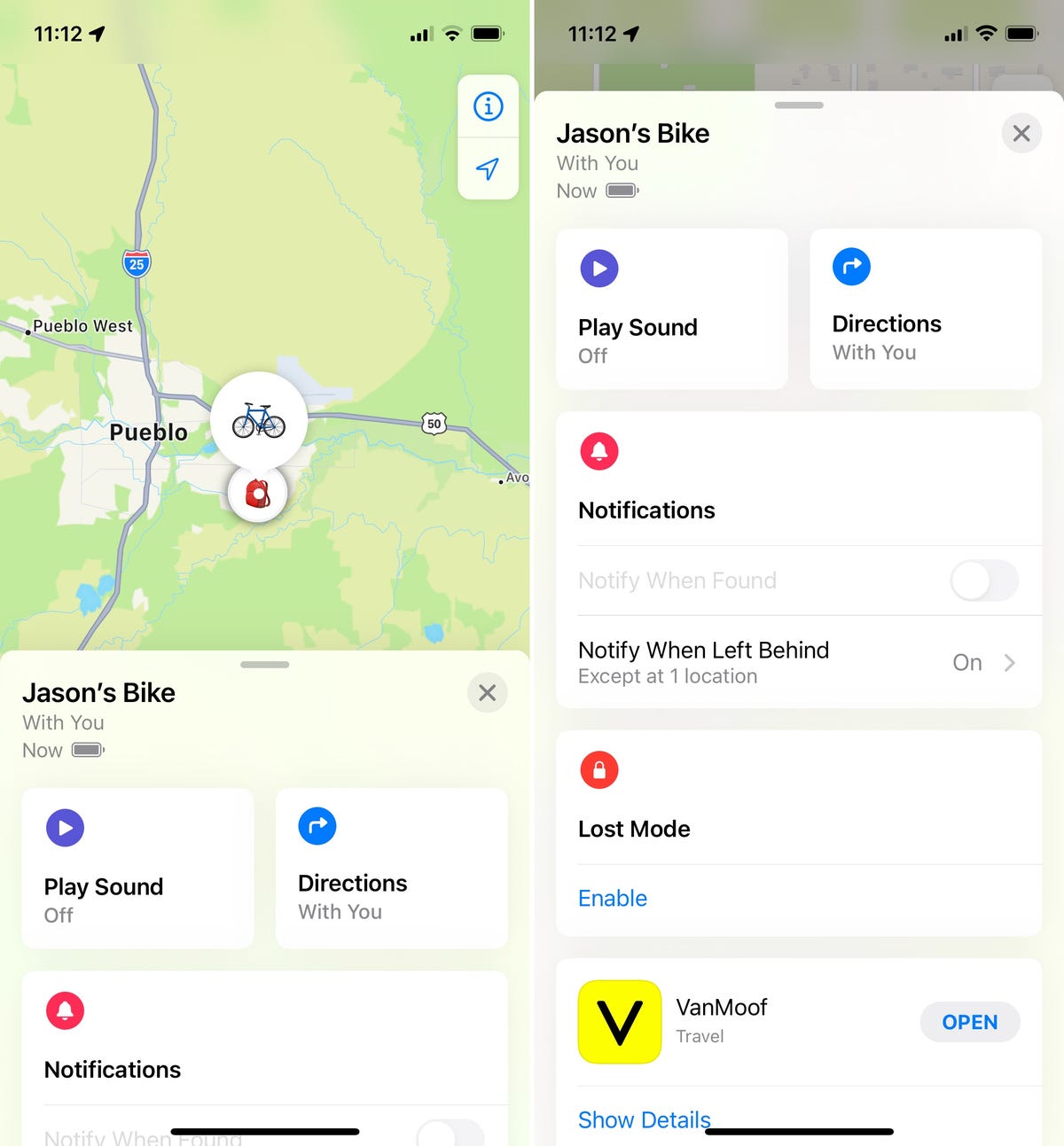
The Find My app with the VanMoof S3 added to it for Apple users.
Speaking of tracking location — by adding the ability to connect the bike to Apple’s Find My network, even if someone steals your bike, you should have a good idea of its current location at any time. The bike will connect to random Apple devices and anonymously send its location back to your Apple account, allowing you to track it. It’s the same technology that’s built into Apple’s AirTags, only it’s in a bike. Setting that functionality up took a few extra seconds and was handled through the VanMoof app.
If you use Android or don’t want to trust Apple’s Find My network with finding a lost bike, VanMoof does offer a Peace of Mind package that includes either maintenance, theft protection or both. It’s pricey, with the maintenance plan costing $348, theft protection priced at $398, or a combination package for $690.
However, if your bike is stolen and VanMoof can’t recover it using the built-in GSM connectivity within two weeks, the company will replace the bike. VanMoof has a series on its YouTube channel showing how its bike hunters travel through different cities and locate lost bikes.
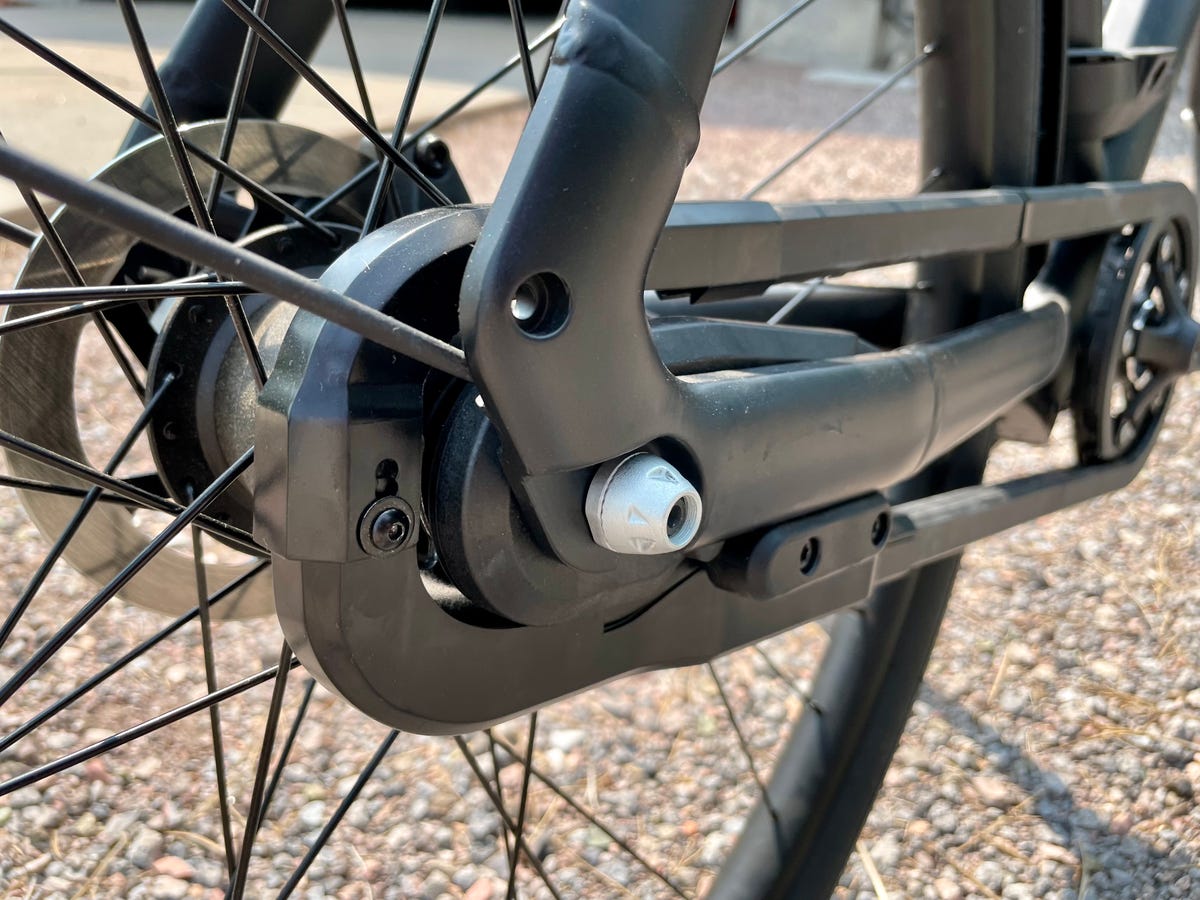
The rear wheel with electronic shifter on the VanMoof S3.
Jason Cipriani/ZDNet
Design and specifications
The S3 has a front-wheel motor with a top speed of 20 miles per hour and power ranging from 250W to 350W. There’s a 504Wh LG battery that lasts anywhere from 37 to 93 miles, based on how much you use boost or pedal assist during your rides. Charging the battery takes about 4 hours for a full charge, or you can get to 50% in roughly 80 minutes.
The S3 is the largest model VanMoof makes. It has 28-inch wheels, weighs 46.3 pounds, and is made for riders 5-foot 8-inches to 6-foot 8-inches. The X3 has 24-inch wheels and is made for those between 5-feet and 6-foot 5-inches for the same price as the S3.
Each wheel has its own hydraulic disc brake. The entire time I rode the bike the front brake had a bit of a squeak to it, but it’s apparently normal for disc brakes to have a break-in period. I’ve adjusted the brake a few times and it’s helped.
On the rear wheel you’ll find a kick lock that prevents the wheel from moving. If someone starts to roll off with your bike, a visual alert plays on the matrix screen that’s on the bar near the handlebars. The skull and crossbones icon is accompanied by a loud siren, alerting anyone nearby that something is wrong. On the opposite of the bar with the display, which also shows your current speed during rides, and other information at various times, is a very loud speaker and a power button. When you press the horn button, an audio file is played through the speaker to alert nearby riders or people.
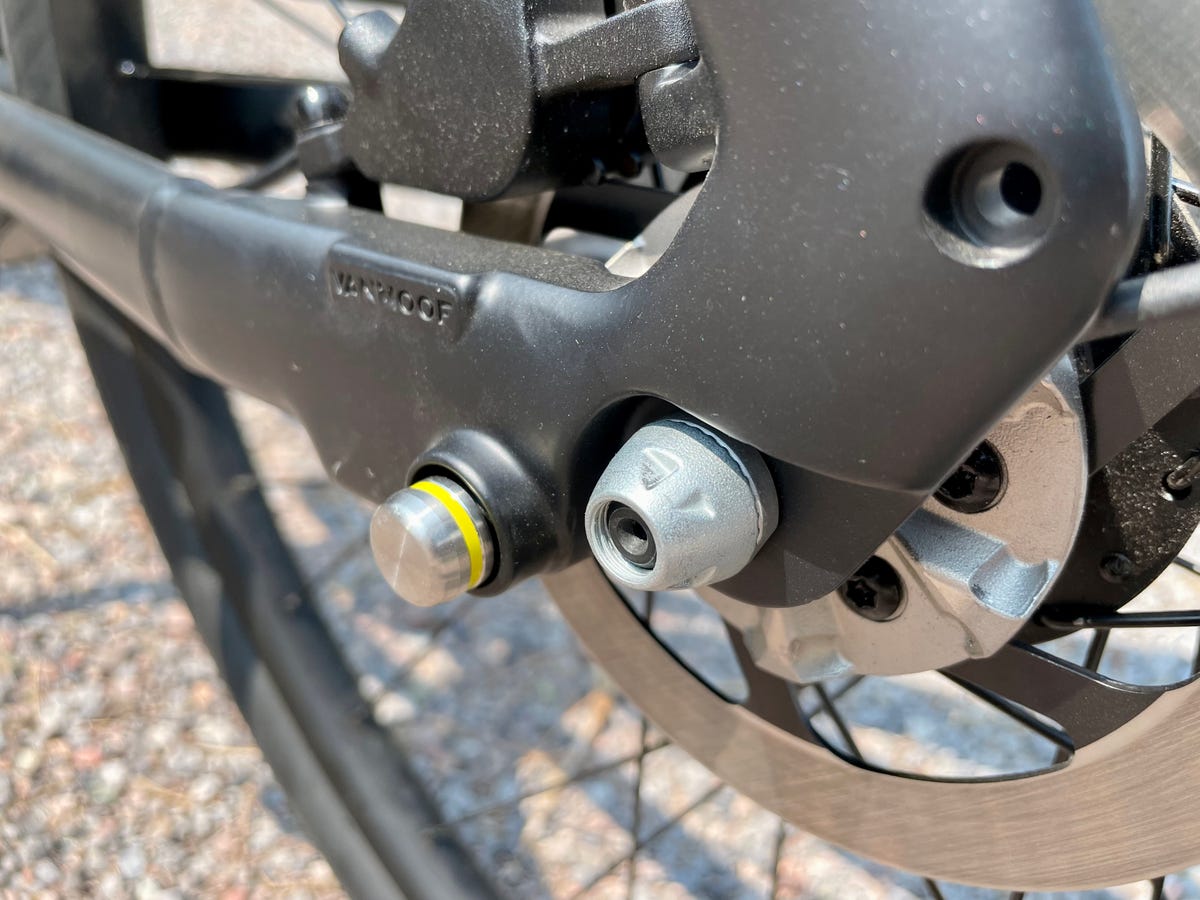
That button with the yellow line is the kick lock.
Jason Cipriani/ZDNet
The rear wheel also has an electronic automatic shifting 4-gear hub that takes the guesswork out of when you should be in a specific gear. A software update for the bike and the app was released during my time with the S3 that enabled manually shifting for more control. One common complaint I’ve read about the S3 and experienced myself is that when the e-shifter changes gears, the chain makes a clunk sound. The only way I can figure out to get around this sound is to try and guess when the shifter is going to make a change (it’s done at specific MPH measurements) and stop pedaling for a brief second. After a few rides, timing this change became almost second nature. However, the manual shifting feature will surely eliminate any issues for those who want it.
On either side of the handlebars is a brake lever, along with a single button. The left button triggers your assigned horn or bell sound, while the right button activates boost mode to maximize your cruising speed. There are LED lights on the front and back of the bike to help with late afternoon or night riding.
The style of the S3 is very minimal and feels like each piece and part has a purpose. It comes in an all-black finish, or sky-blue.
What it’s like to ride
Up until riding the S3, I assumed that eBikes required no pedaling. You either pushed a button or throttle and just went along for the ride. I was so wrong.
There are some eBikes that are like that, but the majority of eBikes I’ve since researched offer pedal assistance. Meaning, the motor will turn on and help you as long as the pedals are moving. Once you stop pedaling, the motor stops. And while that does mean you can pedal slower than usual to reach a speed of, say, 15MPH, you’re still physically active.
With the S3, there are technically 5 different pedal assist levels. Setting the bike to zero turns off all pedal assist, reverting it to a more traditional bike, lacking any help from the motor. Levels one through four offer help up to a specific speed. Level one will help you get to 10MPH while pedaling, and level four will keep you at 20MPH as long as your feet are moving.
The boost button on the right side of the handlebars will crank the motor to full speed, regardless of your current pedal assist level, and keep you at the full 20MPH — again, as long as the pedals are moving.
When you’re at a higher pedal assist level or using the boost button a lot, battery life will naturally decrease. The less you use pedal assist, the longer the battery will last.
If you’ve ever driven or rode in an electric vehicle, you know that there’s instant torque whenever the pedal is pushed. The first time I pressed the boost button on the S3, I was a little hesitant. I didn’t know if the same torque would be present, and if I should be holding on for dear life. Instead, there’s a gradual increase to the motor’s power until you reach top speed. Never did I feel like I was at risk of losing control.
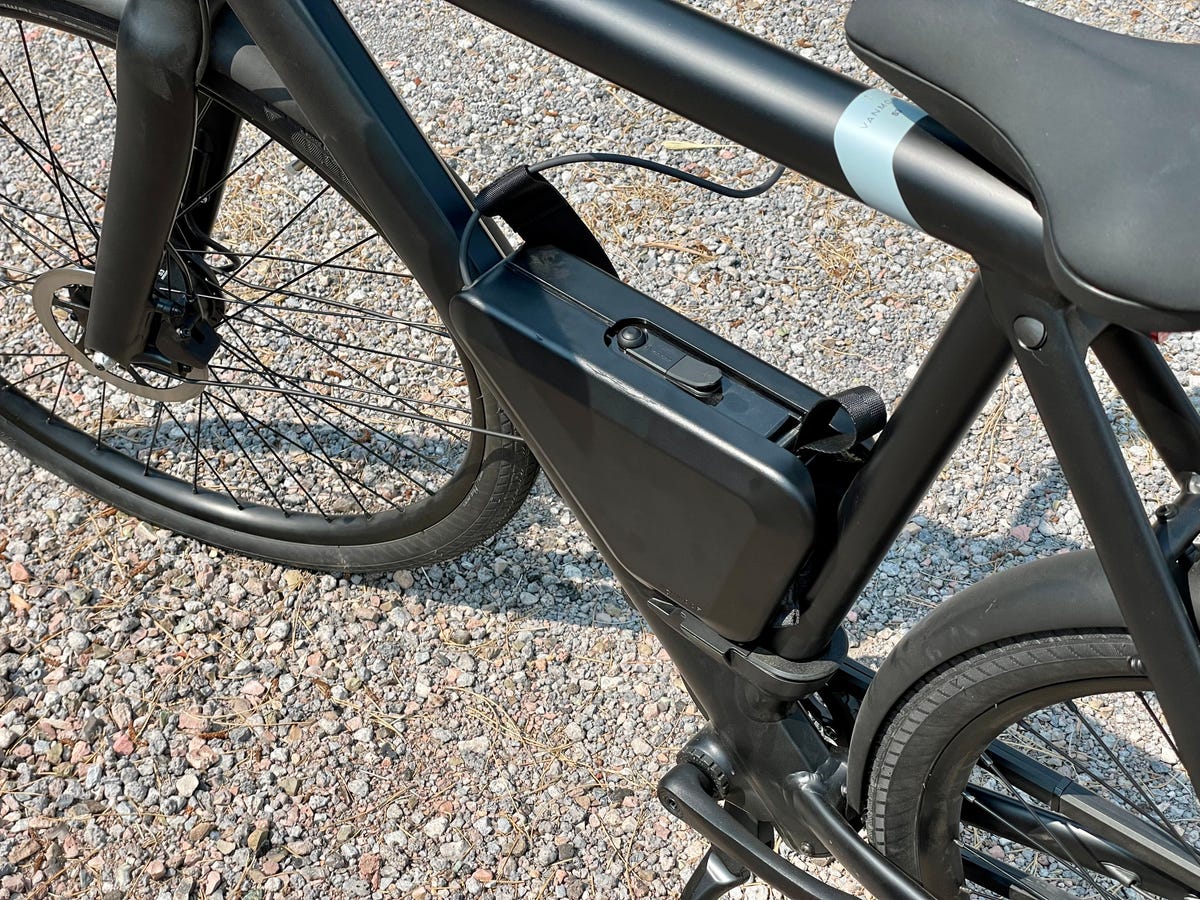
The VanMoof S3 with PowerBank.
Jason Cipriani/ZDNet
My riding over the nearly 100 miles of testing was mixed, as some of the time I was riding with my family who have regular bikes, and other times by myself. I didn’t track specifics, but I believe the lowest the battery reached was around 30% of a charge, but with the additional PowerBank, all I had to do was press the power button and the bike was charging — either while I was riding, or while the bike was parked. The PowerBank attaches the bike via a locking mechanism and can add anywhere from 28 to 62 more miles of range. It’s heavy, adding 6.2 pounds to the total weight of the bike.
I don’t think I have a need or use for the PowerBank. The bike is easy enough to park next to an outlet when I need to charge it, but for someone who has to carry the S3 up several flights of stairs just to charge it, I can see the PowerBank being a convenient accessory.
Outside of the squeaky front brake disc, the only issue I experienced while riding the S3 was flat tires. I’m not sure if I kept running over stickers that were strong enough to poke holes through the wheels and the tubes, or if I was hitting something else on my rides, but during my time with the S3 I had a total of four flats. The first time around, I replaced the tubes because I wanted to get a feel for what all is involved with taking both wheels off and doing maintenance myself. The second time around, I resorted to patching the tube.
It’s not the fault of VanMoof’s, and likely a byproduct of the area I live in, but hopefully it’s something I can figure out should I decide to buy an S3 of my own. I need to look into whether or not you can use slime in the tubes on eBikes, or the best approach to keep random flats to a minimum.
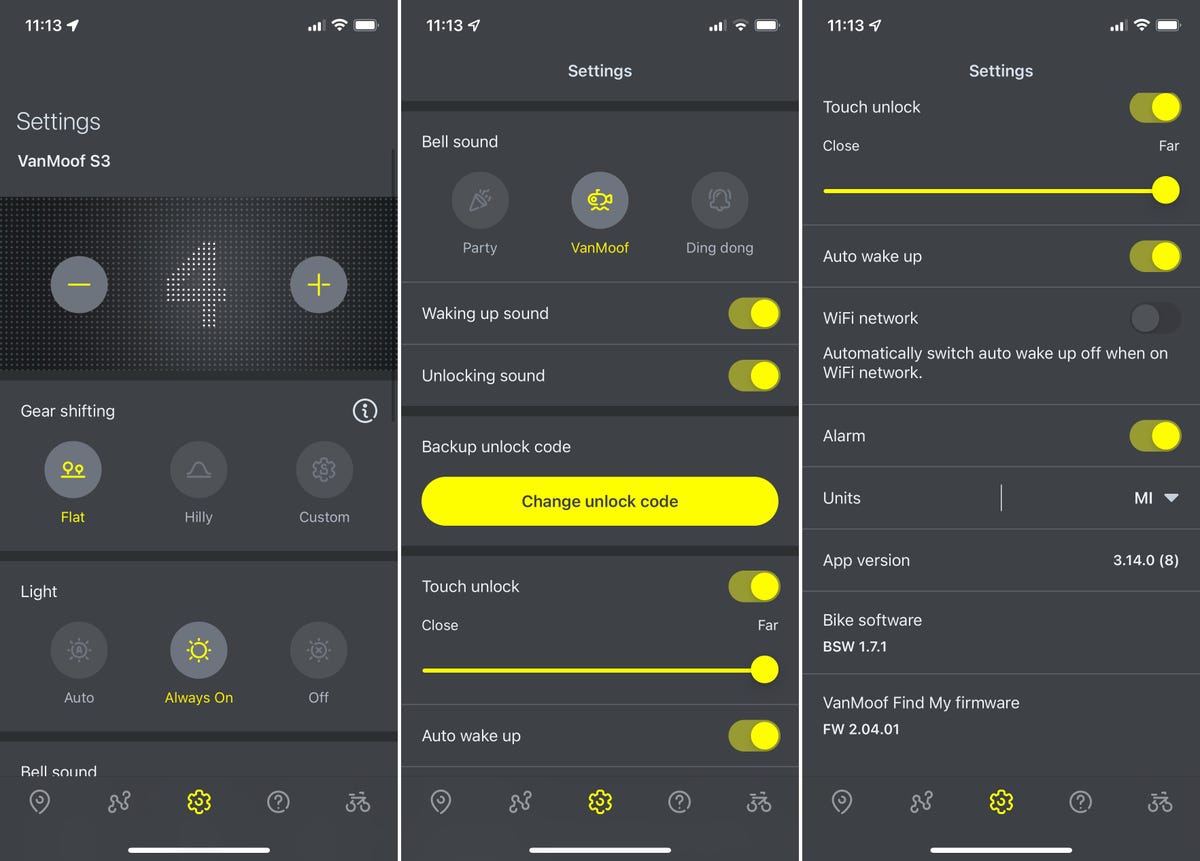
All of the options and settings currently available in the VanMoof app.
Jason Cipriani/ZDNet
The S3, and by extension the X3, are bikes designed for someone who wants a reliable bike for the commute to work, or something safe and fun to ride at home.
The $2,300 price tag may sound like a lot, and it is, but when you look at the eBike landscape, the S3 is actually priced lower than its competitors and offers more advanced technology.
If you had asked me to create a list of what I wanted in an eBike, I would have started with connectivity and some sort of smarts. The VanMoof offers both through the smartphone app and Find My integration, and auto-shifting based on how fast you’re riding.
The S3 really does feel like a bike that’s the love child of Apple and Tesla, with user experience and technology at the forefront, combined with the fact that it’s just downright fun to ride.
See also: Best eBikes for commuting

